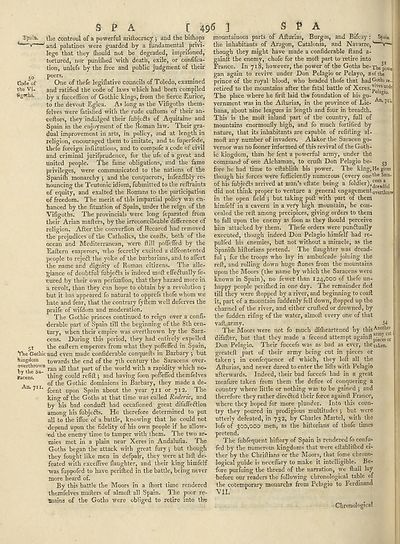Encyclopaedia Britannica, or, a Dictionary of arts, sciences, and miscellaneous literature : enlarged and improved. Illustrated with nearly six hundred engravings > Volume 19, Scripture-SUG
(544) Page 496
Download files
Complete book:
Individual page:
Thumbnail gallery: Grid view | List view

SPA [ 496 3 s P
‘'Spain, tlae Controul of a powerful ariftocracy j and the bilhops mountainous parts of Aflunas,
—-y—w ancj palatines were guarded by a fundamental
So
Code of
the Vi.
figoths.
a tunaamemai privi¬
lege that they ftiould not be degraded, impriioned,
tortured, nor puniftied with death, exile, or confifca-
tion, unlefs by the free and public judgment of their
peers.
One of thefe legiflative councils of Toledo, examined
and ratified the code of laws which had been compiled
by a fucceffion of Gothic kings, from the fierce Eurice,
to the devout Egica. As long as the Vifigoths them-
felves were fatisfied with the rude cuftoms of their an-
ceftors, they indulged their fubjedls of Aquitaine and
Spain in the enjoyment of the Roman law. Their gra¬
dual improvement in arts, in policy, and at length in
religion, encouraged them to imitate, and to fuperfede,
thefe foreign infiitutions, and to compofe a code of civil
and criminal jurifprudenee, for the ufe of a great and
united people. The fame obligations, and the fame
privileges, were communicated to the nations of the
Spanifti monarchy j and the conquerors, infenfibly re*
frouncing the Teutonic idiom, fubmitted to the reftraints
of equity, and exalted the Romans to the participation
of freedom. The merit of this impartial policy was en¬
hanced by the fituation of Spain, Under the reign of the
Vifigoths. The provincials were long feparated from
their Arian mafters, by the irreconcileable difference of
religion. After the converfion of Recared had removed
the prejudices of the Catholics, the coaits, both of the
ocean and Mediterranean, were ftill poffeffed by the
Ealtern emperors, who fecretly excited a difcontented
people to rejeft the yoke of the barbarians, and to affert
the name and dignity of Roman citizens. The alle¬
giance of doubtful fubjefts is indeed mnft effeflually fe-
cured by their own perfuafion, that they hazard more in
a revolt, than they can hope to obtain by a revolution J
but it has appeared fo natural to opprefs thofe whom we
hate and fear, that the contrary fyftem -well deferves the
praife of wifdom and moderation.
The Gothic princes continued to reign over a confi-
-derable part of Spain till the beginning of the 8 th cen¬
tury, when their empire was overthrown by the Sara¬
cens. During this period, they had entirely expelled
the eaftern emperors from what they poffeffed in Spain,
The Gothic and even made confiderable conquefts in Rarbary j but
kingdom towards the end of the 7th century the Saracens over¬
ran all that part of the world with a rapidity which no¬
thing could refill *, and having foon poffeffed themfelves
of the Gothic dominions in Barbary, they made a de-
fcent upon Spain about the year 711 or 712. The
king of the Goths at that time was called Rodertc, and
by his bad condu£l had occafioned great difaffedlion
among his fubje&s. He therefore determined to put
all to the iffue of a battle, knowing that he could not
depend upon the fidelity of his own people if he allowr-
ed the enemy time to tamper with them. The two ar¬
mies met in a plain near Xeres in Andalufia. The
Goths began the attack with crreat fury 5 but though
they fought like men in defpalr, they were at laft de¬
feated with exceflive daughter, and their king himfelf
was fuppofed to have perilhed in the battle, being never
more heard of.
By this battle the Moors in a fhort time rendered
themfelves mailers of almoll all Spain. The poor re-
tnains of the Goths -were obliged to retire into the
overthrown
by the ia-
yacens.
An. 711.
S3
Burgos, and Bifcay : Spain,
the inhabitants of Aragon, Catalonia, and Navarre,
though they might have made a confiderable Hand a-
gainll the enemy, chofe for the moll part to retire into
France. In 718, however, the power of the Goths be-xhepowa
gan again to revive under Don Pelagio or Pelayo, a of the
prince of the royal blood, who headed thofe that had Goths re-
retired to the mountains after the fatal battle of Xeres. plv,eS^n<Nj
The place where he firlt laid the foundation of his go- e a^10'
vernment was in the Allurias, in the province of Lie-
bana, about nine leagues in length and four in breadth.
This is the moll inland part of the country, full of
mountains enormoudy high, and fo much fortified by
nature, that its inhabitants are capable of refilling al.
mod any number of invaders. Alakor the Saracen go¬
vernor was no fooner informed of this revival of the Goth¬
ic kingdom, than he fent a porverful army, under the
command of one Alchaman, to crulh Doft Pelagio be¬
fore he had time to eftablilh his power. The king, He gives
though his forces were fufficiently numerous (every oned1653™-
of his fubjefls arrived at man’s edate being a foldier),
did not think proper to venture a general engagement0^^*
in the open field 5 but taking poll with part of them
himfelf in a cavern in a very high mountain, he con¬
cealed the red among precipices, giving orders to them
to fall upon the enemy as foon as they Ihould perceive
him attacked by them. Thefe orders were punctually
executed, though indeed Don Pelagio himfelf had re-
pulfed his enemies, but not without a miracle, as the
Spanilh hidorians pretend. The daughter was dread¬
ful j for the troops -who lay in ambufcade joining the
red, and rolling down huge dones from the mountains
upon the Moors (the name by which the Saracens were
known in Spain), no fewer than 124,000 of thefe un-
happy people peridied in one day. The remainder ded
till they were dopped by a river, and beginning to coad
it, part of a mountain fuddenly fell down, dopped up the
channel of the river, and either crudied or drowned, by
the fudden ridng of the water, almod every one of that
vad army.
The Moors were not fo much didieartened by thisAnotll^t
difadter, but that they made a fecond attempt againdp™gSor
Dun Pelagio. Their fuccefs was as bad as ever, thetaken.
greated part of their army being cut in pieces or
taken •, in confequence of which, they lod all the
Adurias, and never dared to enter the lids with Pelagio
afterwards. Indeed, their bad fuccefs had in A great
meafure taken from them the defire of conquering a
country where little or nothing was to be gained ; and
therefore they rather direCled their force againd France,
where they hoped for more plunder. Into this coun¬
try they poured in prodigious multitudes; but were
utterly defeated, in 732, by Charles Martel, with the
lofs of 300,000 men, as the hidorians of thofe times
pretend.
The fubfequent hidory of Spain is rendered fo confu-
fed by the numerous kingdoms that were edablidied ei¬
ther by the Chridians or the Moors, that fome chrono¬
logical guide is neceffary to make it intelligible. Be¬
fore purfuing the thread of the narration, wTe diall lay
before our readers the following chronological table of
the cotemporary monarchs from Pelagio to Ferdinand
VIE
54
Chronological
‘'Spain, tlae Controul of a powerful ariftocracy j and the bilhops mountainous parts of Aflunas,
—-y—w ancj palatines were guarded by a fundamental
So
Code of
the Vi.
figoths.
a tunaamemai privi¬
lege that they ftiould not be degraded, impriioned,
tortured, nor puniftied with death, exile, or confifca-
tion, unlefs by the free and public judgment of their
peers.
One of thefe legiflative councils of Toledo, examined
and ratified the code of laws which had been compiled
by a fucceffion of Gothic kings, from the fierce Eurice,
to the devout Egica. As long as the Vifigoths them-
felves were fatisfied with the rude cuftoms of their an-
ceftors, they indulged their fubjedls of Aquitaine and
Spain in the enjoyment of the Roman law. Their gra¬
dual improvement in arts, in policy, and at length in
religion, encouraged them to imitate, and to fuperfede,
thefe foreign infiitutions, and to compofe a code of civil
and criminal jurifprudenee, for the ufe of a great and
united people. The fame obligations, and the fame
privileges, were communicated to the nations of the
Spanifti monarchy j and the conquerors, infenfibly re*
frouncing the Teutonic idiom, fubmitted to the reftraints
of equity, and exalted the Romans to the participation
of freedom. The merit of this impartial policy was en¬
hanced by the fituation of Spain, Under the reign of the
Vifigoths. The provincials were long feparated from
their Arian mafters, by the irreconcileable difference of
religion. After the converfion of Recared had removed
the prejudices of the Catholics, the coaits, both of the
ocean and Mediterranean, were ftill poffeffed by the
Ealtern emperors, who fecretly excited a difcontented
people to rejeft the yoke of the barbarians, and to affert
the name and dignity of Roman citizens. The alle¬
giance of doubtful fubjefts is indeed mnft effeflually fe-
cured by their own perfuafion, that they hazard more in
a revolt, than they can hope to obtain by a revolution J
but it has appeared fo natural to opprefs thofe whom we
hate and fear, that the contrary fyftem -well deferves the
praife of wifdom and moderation.
The Gothic princes continued to reign over a confi-
-derable part of Spain till the beginning of the 8 th cen¬
tury, when their empire was overthrown by the Sara¬
cens. During this period, they had entirely expelled
the eaftern emperors from what they poffeffed in Spain,
The Gothic and even made confiderable conquefts in Rarbary j but
kingdom towards the end of the 7th century the Saracens over¬
ran all that part of the world with a rapidity which no¬
thing could refill *, and having foon poffeffed themfelves
of the Gothic dominions in Barbary, they made a de-
fcent upon Spain about the year 711 or 712. The
king of the Goths at that time was called Rodertc, and
by his bad condu£l had occafioned great difaffedlion
among his fubje&s. He therefore determined to put
all to the iffue of a battle, knowing that he could not
depend upon the fidelity of his own people if he allowr-
ed the enemy time to tamper with them. The two ar¬
mies met in a plain near Xeres in Andalufia. The
Goths began the attack with crreat fury 5 but though
they fought like men in defpalr, they were at laft de¬
feated with exceflive daughter, and their king himfelf
was fuppofed to have perilhed in the battle, being never
more heard of.
By this battle the Moors in a fhort time rendered
themfelves mailers of almoll all Spain. The poor re-
tnains of the Goths -were obliged to retire into the
overthrown
by the ia-
yacens.
An. 711.
S3
Burgos, and Bifcay : Spain,
the inhabitants of Aragon, Catalonia, and Navarre,
though they might have made a confiderable Hand a-
gainll the enemy, chofe for the moll part to retire into
France. In 718, however, the power of the Goths be-xhepowa
gan again to revive under Don Pelagio or Pelayo, a of the
prince of the royal blood, who headed thofe that had Goths re-
retired to the mountains after the fatal battle of Xeres. plv,eS^n<Nj
The place where he firlt laid the foundation of his go- e a^10'
vernment was in the Allurias, in the province of Lie-
bana, about nine leagues in length and four in breadth.
This is the moll inland part of the country, full of
mountains enormoudy high, and fo much fortified by
nature, that its inhabitants are capable of refilling al.
mod any number of invaders. Alakor the Saracen go¬
vernor was no fooner informed of this revival of the Goth¬
ic kingdom, than he fent a porverful army, under the
command of one Alchaman, to crulh Doft Pelagio be¬
fore he had time to eftablilh his power. The king, He gives
though his forces were fufficiently numerous (every oned1653™-
of his fubjefls arrived at man’s edate being a foldier),
did not think proper to venture a general engagement0^^*
in the open field 5 but taking poll with part of them
himfelf in a cavern in a very high mountain, he con¬
cealed the red among precipices, giving orders to them
to fall upon the enemy as foon as they Ihould perceive
him attacked by them. Thefe orders were punctually
executed, though indeed Don Pelagio himfelf had re-
pulfed his enemies, but not without a miracle, as the
Spanilh hidorians pretend. The daughter was dread¬
ful j for the troops -who lay in ambufcade joining the
red, and rolling down huge dones from the mountains
upon the Moors (the name by which the Saracens were
known in Spain), no fewer than 124,000 of thefe un-
happy people peridied in one day. The remainder ded
till they were dopped by a river, and beginning to coad
it, part of a mountain fuddenly fell down, dopped up the
channel of the river, and either crudied or drowned, by
the fudden ridng of the water, almod every one of that
vad army.
The Moors were not fo much didieartened by thisAnotll^t
difadter, but that they made a fecond attempt againdp™gSor
Dun Pelagio. Their fuccefs was as bad as ever, thetaken.
greated part of their army being cut in pieces or
taken •, in confequence of which, they lod all the
Adurias, and never dared to enter the lids with Pelagio
afterwards. Indeed, their bad fuccefs had in A great
meafure taken from them the defire of conquering a
country where little or nothing was to be gained ; and
therefore they rather direCled their force againd France,
where they hoped for more plunder. Into this coun¬
try they poured in prodigious multitudes; but were
utterly defeated, in 732, by Charles Martel, with the
lofs of 300,000 men, as the hidorians of thofe times
pretend.
The fubfequent hidory of Spain is rendered fo confu-
fed by the numerous kingdoms that were edablidied ei¬
ther by the Chridians or the Moors, that fome chrono¬
logical guide is neceffary to make it intelligible. Be¬
fore purfuing the thread of the narration, wTe diall lay
before our readers the following chronological table of
the cotemporary monarchs from Pelagio to Ferdinand
VIE
54
Chronological
Set display mode to:
![]() Universal Viewer |
Universal Viewer | ![]() Mirador |
Large image | Transcription
Mirador |
Large image | Transcription
Images and transcriptions on this page, including medium image downloads, may be used under the Creative Commons Attribution 4.0 International Licence unless otherwise stated. ![]()
| Permanent URL | https://digital.nls.uk/192702354 |
|---|
| Attribution and copyright: |
|
|---|
| Description | Ten editions of 'Encyclopaedia Britannica', issued from 1768-1903, in 231 volumes. Originally issued in 100 weekly parts (3 volumes) between 1768 and 1771 by publishers: Colin Macfarquhar and Andrew Bell (Edinburgh); editor: William Smellie: engraver: Andrew Bell. Expanded editions in the 19th century featured more volumes and contributions from leading experts in their fields. Managed and published in Edinburgh up to the 9th edition (25 volumes, from 1875-1889); the 10th edition (1902-1903) re-issued the 9th edition, with 11 supplementary volumes. |
|---|---|
| Additional NLS resources: |
|

